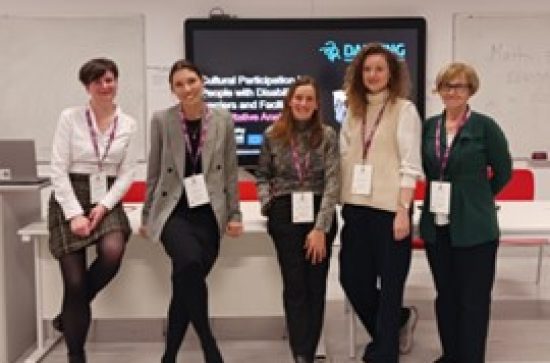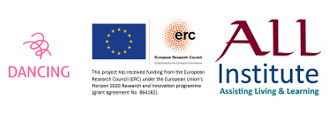
On the occasion of the Irish Association of Law Teachers’ (IALT) Annual Conference held on 10 and 11 November 2023 at Dublin City University (DCU), the research team of the European Research Council (ERC) funded project ‘Protecting the Right to Culture of Persons with Disabilities and Enhancing Cultural Diversity through European Union Law: Exploring New Paths – DANCING’ presented some interim findings of the project.
A dedicated panel chaired by Principal Investigator Professor Delia Ferri saw Dr. Ann Leahy (post-doctoral researcher) and early career researchers Léa Urzel Francil (PhD candidate), Iryna Tekuchova (PhD candidate) and Eva Sophie Krolla (research assistant) discuss several aspects of the empirical and normative research conducted thus far under Work Packages (WPs) 1 and 2 of the project respectively.
Dr. Ann Leahy discussed findings of WP1 and the qualitative research conducted in 28 European countries, examining barriers to, and facilitators of, cultural participation by people with disabilities as perceived by representatives of organisations of people with disabilities, of Deaf people, and of organisations working on arts and disability. It encompassed all art-forms as well as cultural heritage, and it considered participation both as audience and as creators of culture.
Eva Sophie Krolla then turned to examine relevant European Union (EU) legislation regulating access to cultural goods and services across the Union based on a recent article by Professor Delia Ferri entitled ‘The Role of the European Union in ensuring accessibility of cultural goods and services: all about that…internal market?’ published in the European Law Review and subsequent, on-going research in this area focussing on access from an audience and cultural consumer perspective.
To complement the picture, Léa Urzel Francil presented parts of her PhD research into the role of EU law in advancing the participation of cultural professionals and artists with disabilities, thus considering the access and participation in cultural life from a practitioner point of view. Particularly, she considered two EU instruments: the Directive 2000/78 (or Employment Equality Directive) and the Creative Europe Programme, highlighting how anti-discrimination legislation may contribute to advancing the participation of cultural professionals and artists with disabilities, with a particular emphasis on the provision of reasonable accommodation.
The final contribution was made by Iryna Tekuchova on the global reach of EU Disability Law in Eastern Partnership (EaP) countries considering in particular cultural participation of persons with disabilities. Recalling key features of EU international ‘actorness’, the presentation examined the extent to which EU disability norms affect the legal orders of third countries under the EaP initiative. Through the theoretical lens of ‘the global reach of EU law’ Iryna further discussed the EU external action tools and mechanisms available in assisting the EU in promoting disability rights and facilitating the adoption of EU disability standards outside its border.
The DANCING project is based at the School of Law and Criminology as well as the Assisting Living and Learning (ALL) Institute at Maynooth University.

